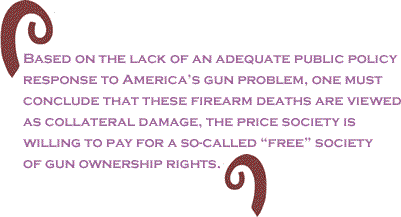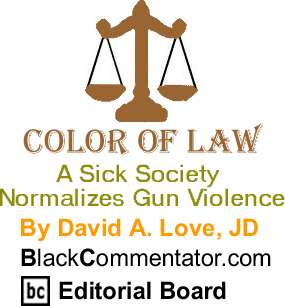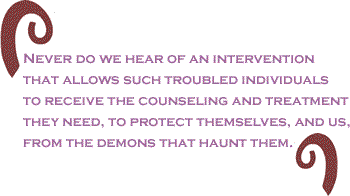
|
||||||||||||||||||||||
|
||||
 |
||||
Sadly, it�s the sort of thing that happens on a regular basis these days. Someone, whether a disgruntled employee, a mentally unstable individual, a socially-awkward or obsessive person, you fill in the blank, goes on a shooting spree and exacts vengeance through the barrel of a gun.� People express shock that this sort of thing could happen where they live, in the safe environs far from the nation�s notoriously crime-ridden inner cities.� Some will claim there were no indications the shooting suspect was capable of such violence.� Meanwhile, others will insist there was always something off about the person.� In any case, after the obligatory media coverage and perfunctory surface-level discussions, after the memorials are held, the grief counselors are dispatched and the victims are buried, things generally go back to normal.� All is forgotten, that is, until the next tragic shooting that leaves x number of people dead and y number of people injured. It was said that Amy Bishop, that biology professor at the University of Alabama-Huntsville, was angry because she had been denied tenure by the university.� She supposedly visited a shooting range before her shooting rampage.� And she was obsessed with President Obama.� We also know that she shot her brother to death years earlier in what ruled an accidental killing, and she was a suspect in an attempted pipe bombing of her professor at Harvard.
Oddly and consistently, such questions are always raised after the fact.� You never hear of a shooting rampage that was thwarted, with the perpetrator-to-be either apprehended or otherwise stopped in his or her (generally his) tracks. Never do we hear of an intervention that allows such troubled individuals to receive the counseling and treatment they need, to protect themselves, and us, from the demons that haunt them. And yet, while we will dismiss the perpetrators of such vicious acts as criminals or mentally disturbed outliers, our response to these tragedies reveals far more about our sick society than the troubled souls who committed the crimes.� Tens of thousands of people die from gunfire in America every year, and most never get media attention.� And yet, in a nation that has normalized the notion of a gun for every person, this is apparently a situation we are willing to tolerate.� Based on the lack of an adequate public policy response to America�s gun problem, one must conclude that these firearm deaths are viewed as collateral damage, the price society is willing to pay for a so-called �free� society of gun ownership rights.
No one can believe that the level of violence, of gun violence, in the United States is compatible with a stable, vibrant and free society.� Add to the mix the high level of hopelessly unemployed and/or foreclosed citizens who lack an outlet to vent their frustrations; the legions of Iraq and Afghanistan veterans who have returned home with undiagnosed or untreated Post-Traumatic Stress Disorder; and the use of prisons as a repository for the mentally ill, with inmates returning to the streets sicker than when they were on lockdown.� Lots of guns, economic despair, deprivation and mental illness�these conditions are a recipe for disaster. In short, we are sick, and we need good medicine.� The nation�s political leadership often has proven too cowardly or too compromised to provide anything more than band-aids, but the band-aids haven�t worked.� In a country with so many crises, gun violence is yet another problem we have avoided for too long, only to have it shoot us in the face.� But we cannot ignore it anymore, and we must make it right.���� BlackCommentator.com Editorial Board member, David A. Love, JD is a journalist and human rights advocate based in Philadelphia, and a contributor to The Huffington Post, theGrio, The Progressive Media Project, McClatchy-Tribune News Service, In These Times and Philadelphia Independent Media Center. He also blogs at davidalove.com, NewsOne, Daily Kos, and Open Salon. Click here to contact Mr. Love.��� |
||||
 |
||||
If you would like to comment on this article, please do so below. There is a 400 character limit. You do not need a FaceBook account. Your comment will be posted here on BC instantly. Thanks. Entering your email address is not mandatory. You may also choose to enter only your first name and your location.
|
||||
Thank you very much for your readership. |
||||
| Any BlackCommentator.com article may be re-printed so long as it is re-printed in its entirety and full credit given to the author and www.BlackCommentator.com. If the re-print is on the Internet we additionally request a link back to the original piece on our Website. | ||||
| |
||||
Issue 363 |
| Executive Editor: Bill Fletcher, Jr. |
| Managing Editor: Nancy Littlefield |
| Publisher: Peter Gamble |
| Est. April 5, 2002 |
| Printer Friendly Version in resizeable plain text format |
 |
 |
 |

|
 |
| |
| |











































